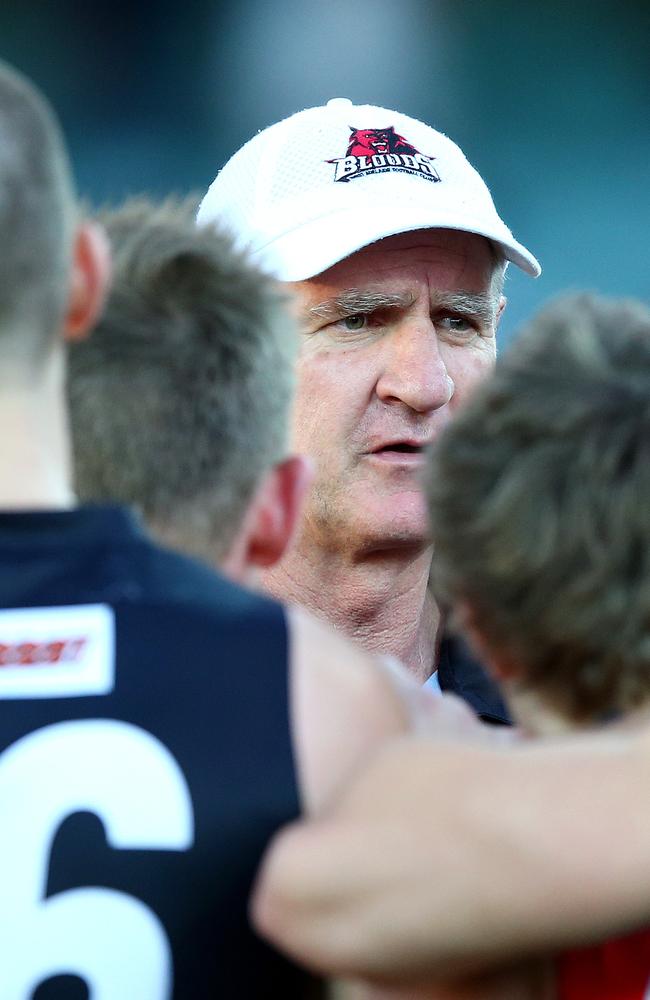SANFL: How West Adelaide rose out of the abyss
THE dust had barely settled on West Adelaide’s disappointing 2014 season when a group of senior players got together and decided they couldn’t allow another season to go to waste.
THE dust had barely settled on West Adelaide’s disappointing 2014 season when a group of senior players got together and decided they couldn’t allow another season to go to waste.
“Guys like Adam Hartlett and Daniel Caire and some of the others basically said ‘enough is enough’,’’ West Adelaide football manager Andrew Marks recalls.
“Some of these guys may only have a few years left and every wasted year is one you don’t get back.”
By their own admission, the Bloods had allowed their standards to drop last year and it was reflected in their results.
West tumbled from third in coach Andrew Collins’ final season in 2013, to ninth in 2014.
The Bloods lost their final three match by an average of 56 points and host of quality players left.
But within the walls of Richmond there was a confidence the club could rebound straight back to the pointy end of the SANFL ladder if standards improved.
Sunday the Bloods play Central District at Adelaide Oval for the right to take on the Eagles in this year’s Grand Final.

West is two wins from completing one of the most remarkable resurgences in SANFL history and club is daring to believe.
Several crucial factors have led the club back to the top end of the ladder this season and flowed from that post-season epiphany among senior players.
The club hired BRS leadership consultant Heath Colebatch to implement a Leading Teams-style program which has had a strong effect on the culture of the football club.
With Colebatch’s help, captain Chris Schmidt, Jason Porplyzia, Jon Beech, Travis Tuck, James Ezard, Caire and Hartlett were elected as the club leadership group.
“It was about getting a driven leadership group together who were also good at driving standards and developing relationships,’’ Colebatch said.
“Our theme the whole year has been about setting high standards and about creating an environment where we look after each other as a football club, care for each other and bring everyone along for the journey.”
With a strong leadership group in place, the Bloods set about addressing their fitness levels.
West was also one of the worst fourth-quarter teams in the SANFL in 2014 and coach Mark Mickan demanded standards improve.
New fitness trainer Sean Baker arrived and players were required to run personal best, or near personal best 3000m times to be considered for selection.
The club has won or tied 15 of 20 final quarters this season.
The other massive factor in West Adelaide’s resurgence this season has been Mickan himself, according to Marks.
The former Bloods, Crows and Brisbane champion has had the difficult role of replacing the full-time Collins, while in a part time capacity.
Marks said subtle tweaks to the game plan had helped the Bloods become more attacking, while maintaining the defensive discipline Collins introduced.
Mickan has his own point to prove to critics these finals, four years on from his sensational sacking at Glenelg.
The former ruckman had the best record of any coach at the Bay in two decades but was axed mid-season in 2011 because the Tigers board did not believe could take the club to a premiership.
Marks said Mickan was more driven to see the Bloods break a 32-year flag drought than to prove anything to doubters.
Mickan won the Bloods best and fairest in the club’s 1983 premiership season but was cruelly robbed of the chance to play in their Grand Final win after injuring his knee late in the season.
“He is a passionate West Adelaide person who is very annoyed and frustrated that we haven’t won a premiership for 32 year,’’ Marks said.
“He’s very determined to change that.”
